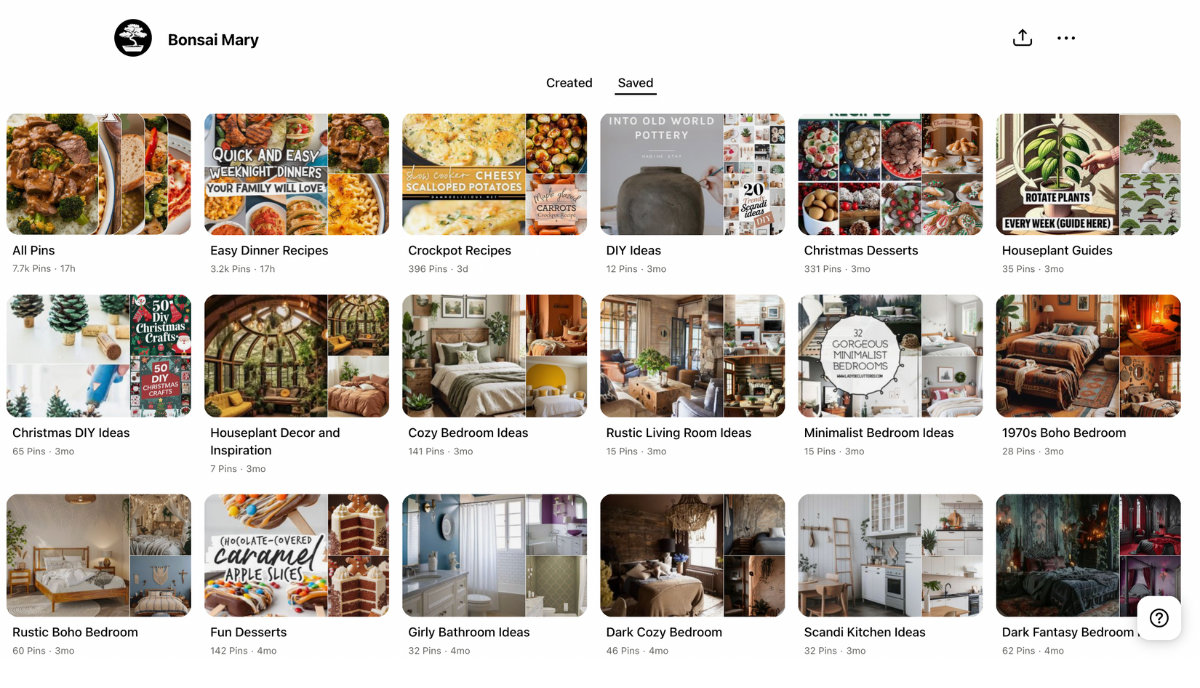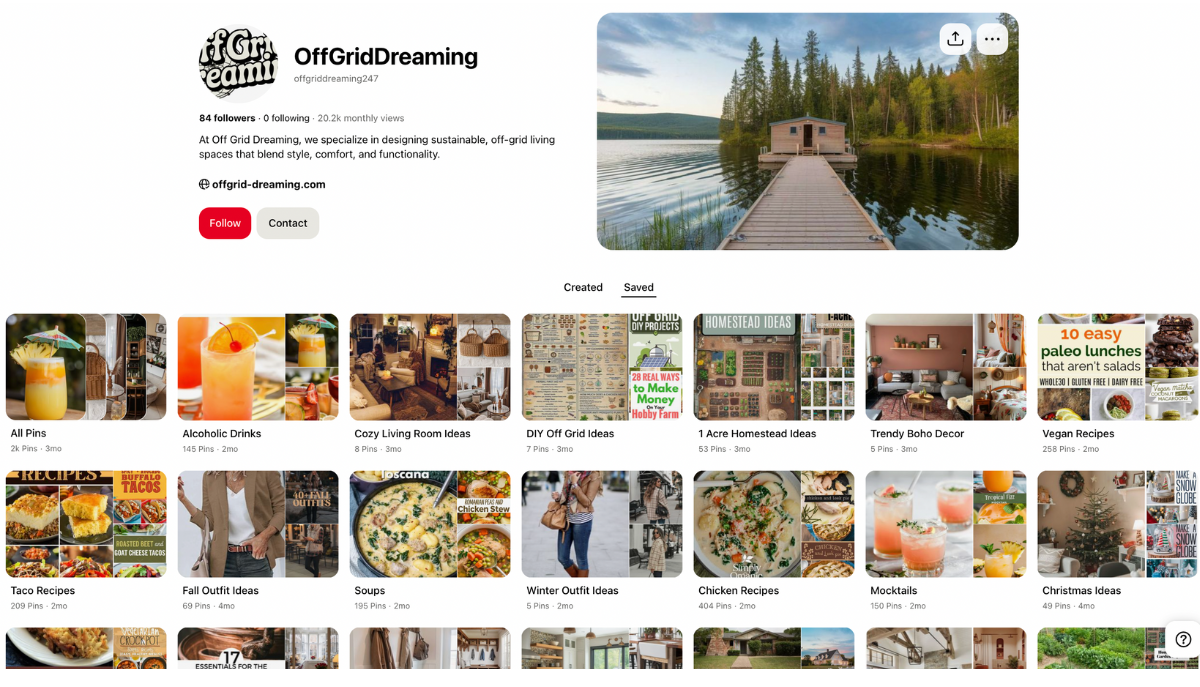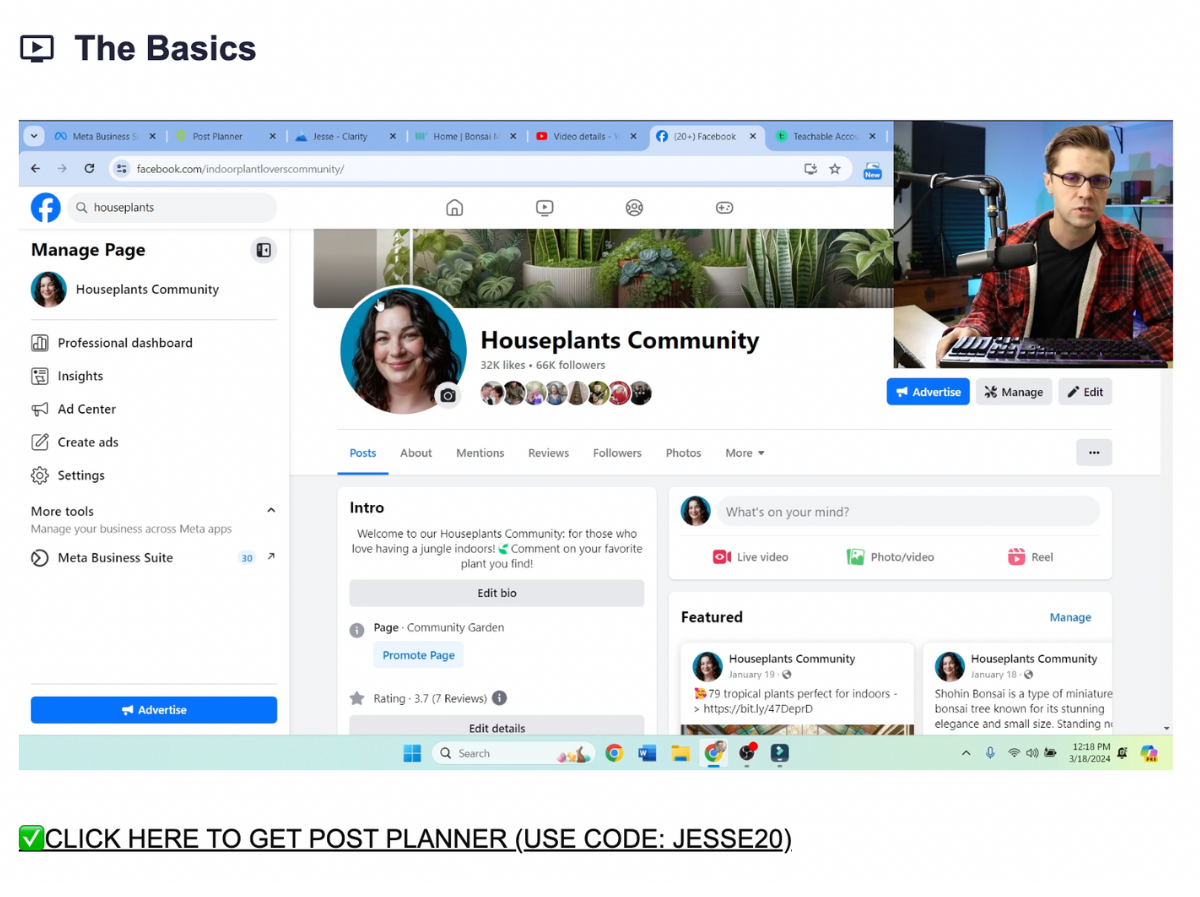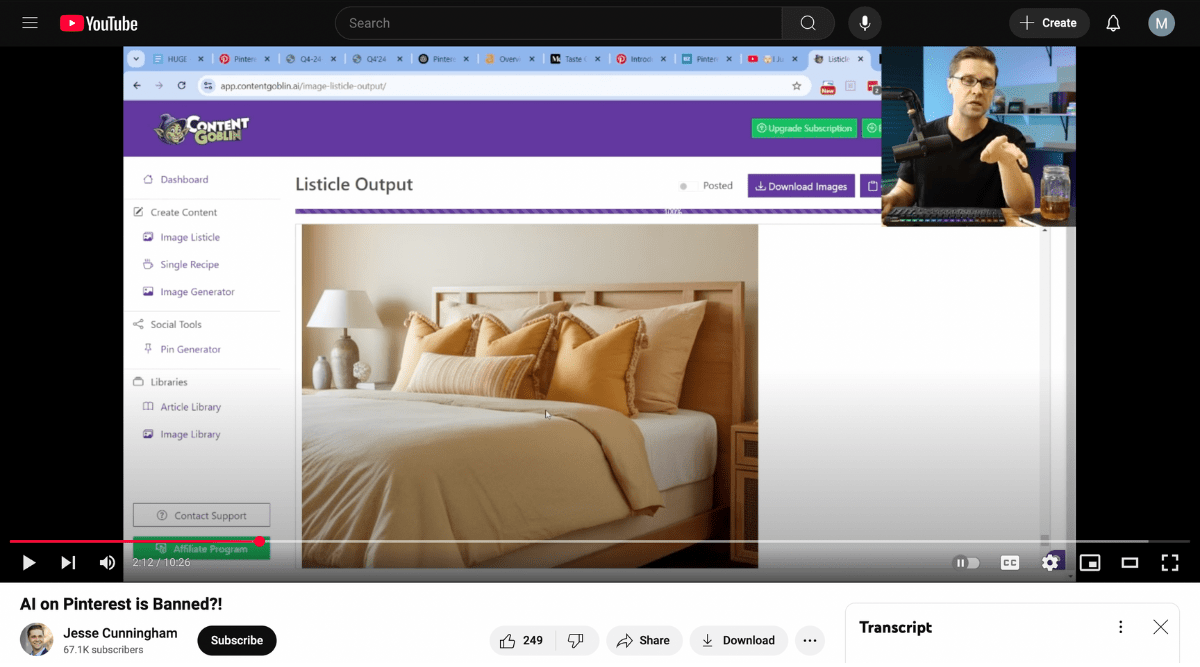
Last year, Jesse Cunningham — a self-described “SEO specialist who leverages the power of AI to drive real results” — appeared in a livestream for a closed members group for SEO secret-trading. He’d been invited to discuss his AI strategies for monetizing content on Facebook, where he claimed to have found financial success by flooding the Meta-owned platform with fake, AI-generated images of things like faux houseplants and ChatGPT-created recipes.
“Don’t ban me, people,” Cunningham jokes into a large microphone, explaining that one of his AI pages had previously been flagged by Meta for violating platform policies after he revealed its name in a public-facing YouTube video.
Cunningham explains that his preferred groups to target are devoted fandoms and the elderly. The former is easily excited, he posits, while the latter probably won’t understand that what they’re clicking on is synthetic at all.
“Best are voracious fan bases. Fan boys, fan girls,” Cunningham tells the group. “And an older demographic, where Aunt Carol doesn’t really know how to use Facebook, and she’s just likely to share everything.”
“I’m going after audience 50-plus female,” he reiterates, explaining that targeting older women on Facebook means his content can be cross-posted over on the aspirational image-sharing-and-sourcing platform Pinterest, the userbase of which is overwhelmingly made up of women.
“Why am I going after females? Because… I want to cross-pollinate the audience,” says Cunningham. “I want to kill two birds with one stone and dominate Pinterest and Facebook at the same time. Fifty-plus female is my demo.”
The recorded call is just under an hour in length. At one point, Cunningham triumphantly declares that he’s “starting new pages in the recipe niche” and wants “to disrupt that whole industry” because, in his telling, it’s “ripe for the taking.”
“Going back to the AI recipes, do you know if they actually work?” someone asks Cunningham later in the clip.
“Of course they work. ChatGPT told me they work,” Cunningham, who looks genuinely baffled by the question, responds. “What kind of question is that?”
Cunningham is one of many sloperators using AI to flood social media with AI content to make money.
The process goes like this. Cunningham publishes large numbers of AI-generated articles to websites helmed by made-up bloggers, with AI-generated headshots, purporting to be experts in topics ranging from houseplants and recipes to DIY holiday crafts and nature scenes. Then he posts AI-generated images linking back to those sites on social, with Cunningham claiming he’s able to rake in cash — not by actually putting time and energy into photographing any actual home gardening, or drafting and testing new recipes, but by using AI to quickly and cheaply imitate traditional content creators’ final product.
Evidence of such zombie tactics employed by Cunningham and others are evident on his preferred platforms, Pinterest and Facebook, where users are increasingly made to wade through swamps of parasitic AI slop.
As Futurism reported earlier this year, Pinterest is facing a pervasive influx of AI-generated content masquerading as the real thing. The torrent of AI slop on Facebook is well-documented as well — last year, an in-depth 404 Media investigation revealed that AI slop farmers around the world had figured out how to use AI to generate engagement-bait imagery designed to earn cash by exploiting Facebook’s since-shuttered Performance Bonus program.
We highlighted Cunningham in our previous reporting about Pinterest. He’s an avid YouTuber, and we were struck by his candor as he publicly shared the sordid details of his slop farming process, which frequently includes copying the work of his competitors — real bloggers and online creators who say the AI influx on Pinterest, Facebook, and other platforms has had a destructive impact on their businesses.
“Across the board, like across the board, this is something that is talked about in blogging groups all the time, because it is devastating all of our businesses,” Rachel Farnsworth, a veteran food blogger of the website The Stay at Home Chef, told Futurism of the impact that schemes like Cunningham’s have had on her industry.
“It’s put a ton of people out of business,” she added.
We decided to dig deeper into Cunningham’s extensive content catalog, on YouTube and beyond, where we found a telling portrait of the layers of unreality shrouding the AI slop increasingly crowding the web — and the attitudes of the slopageddon’s eager purveyers, down to their eagerness to trick old ladies and copy others’ work.
***
According to Cunningham, AI offers a way to pretty much print money online.
“Pinterest is one of the easiest ways to make money online right now,” he declares in a November YouTube video titled “🤯AI Pinterest Strategy for $15,942/MONTH.”
“Our goal is to catch fish,” he adds. He then clarifies: “fish is making money.”
But to “catch fish,” he emphasizes, quantity — made easy by generative AI tools — is key.
“Ten pins daily is not going to cut it,” he adds, explaining that he posts around 80 AI pins a day in his efforts to manipulate Pinterest’s algorithm — enough to get his pins to “cruising altitude,” he says, but not enough to get hit with a spam notice by the platform. “You’re not going to compete with me and the other people doing it at scale.”
But “luckily, nowadays,” he continues, “we have AI.”
![A screengrab from a YouTube video featuring a man sitting behind a desk and speaking to the camera using a large microphone. Over the video, overlaid text reads: "100% AI." The video is captioned: "[Mind-blown emoji] AI Pinterest Strategy for $15,942/MONTH"](https://futurism.com/wp-content/uploads/2025/03/1-1.png?strip=all&quality=85)
His process, as Cunningham lays out across his videos, begins by tracking down existing pins that are already doing well.
In the November video, for instance, he homes in on a parenting-oriented blog called The Mummy Front. The blog isn’t his; instead, Cunningham seeks to use AI to replicate someone else’s viral content at scale.
“So this one here — ‘Andie DIY Ikea Hacks, Crafts to make,’ blah blah blah blah blah — they crush it for Christmas,” Cunningham remarks. “So I can come in here to their Christmas board… and now we’re looking around. We can figure out, all right, this is what works with Christmas, because this is a top-five Christmas page on all of Pinterest.”
Cunningham then zeroes in on one of The Mummy Front’s top-performing pins, which links back to a listicle-style blog post about Christmas wrapping paper ideas.
Drawing on that post, Cunningham takes to an AI-powered content creation tool called Content Goblin where, after inputting just a headline into a text box — he requests a post for “47 Gift Wrapping Ideas You Need To Try for CHRISTMAS” — he’s able to churn out a lengthy listicle in a matter of moments, complete with AI-generated images.
![A screenshot of a YouTube video in which a man, who's sitting behind a desk speaking into a large microphone, shares his screen to show viewers how he uses AI to quickly generate synthetic content about holiday gift-wrapping ideas. The video is captioned: "[Mind-blown emoji] AI Pinterest Strategy for $15,942/MONTH"](https://futurism.com/wp-content/uploads/2025/03/1-2.png?strip=all&quality=85)
Then he uploads the AI-generated blog post, without editing, to a faux blogging site he runs called Bonsai Mary.
![A screenshot of a YouTube video in which a man, who's sitting behind a desk speaking into a large microphone, shares his screen to show viewers how he uses AI to quickly generate synthetic content about holiday gift-wrapping ideas. The video is captioned: "[Mind-blown emoji] AI Pinterest Strategy for $15,942/MONTH"](https://futurism.com/wp-content/uploads/2025/03/2-3.png?strip=all&quality=85)
Bonsai Mary is helmed by an “author” named “Mary Smith,” who features prominently on the site’s landing page, along with an AI-generated headshot.
Despite its bonsai-focused title, the blog’s content is surprisingly wide-ranging — an oddity that its alleged blogger-in-chief, Smith, speaks to in a first-person missive published on its homepage.
“Welcome to Bonsai Mary — this website has been around since 2009! The main focus here is plants but I also love to share recipes and interior decorating things I love,” reads the webpage. “My name is Mary Smith, a seasoned gardener and bonsai artist and author of BonsaiMary.com. I love nature and any new plant I haven’t seen before!”
But Smith is clearly not a real person. In addition to her AI-generated headshot, she has no publishing history outside of Bonsai Mary — except for a blog titled Off Grid Dreaming, which is also operated by Cunningham, according to other YouTube videos.
What’s more, though it’s technically true that the Bonsai Mary website has been around since 2009, archived versions of the site show that Bonsai Mary was actually founded back in the late 2000s by a woman named Mary C. Miller, a real American bonsai artist and author.
It’s unclear when the blog’s domain first switched hands. But according to archived snapshots documented in the Internet Archive’s Wayback Machine, “Mary Smith” didn’t appear until late 2023.

Finally, to publish his AI-generated images to Pinterest, Cunningham uses ChatGPT to drum up short, Pinterest-optimized descriptions for each image. He throws all of that into a spreadsheet, and using a planning tool, mass-uploads links to his synthetic blog. (In other videos, he uses yet another AI tool to overlay headline text onto AI-generated imagery with little effort.)
And from there, he says, he’s “cruising.”
“You,” he tells the viewer, “can use all these tools to get a competitive advantage on everyone.”
Cunningham creates content for a variety of topics — or “niches,” as folks in his industry will say, from cooking and recipes to interior design and decor.

The Pinterest account page for Bonsai Mary, which lists 8.6 million monthly views on its profile, says in its bio that “we create AI pins and blog posts for all to enjoy.” The associated profile for Off Grid Dreaming, which lists around 20.2k monthly views, fails to issue a similar disclaimer.
“At Off Grid Dreaming,” reads its bio, “we specialize in designing sustainable, off-grid living spaces that blend style, comfort, and functionality.” (There’s no evidence that Cunningham, or “Mary,” actually “specialize” in anything beyond SEO.)

But you’d have to actually visit the Bonsai Mary profile page to see that disclaimer, something not everyone who interacts with an individual pin is going to do. None of the individual pins posted to Pinterest by Cunningham that we’ve discovered specifically denote the use of AI through tools like watermarks or text captions. And despite his apparent willingness to broadcast the details of his AI-powered assembly line to other SEOers on YouTube and in members’ forums, we’ve yet to see Cunningham add AI disclaimers to his many AI-generated blog posts or websites.
That appears to be intentional, we found when we signed up for a free, six-episode instructional video series Cunningham offers about his Facebook scheming.
In the second episode, titled “The Basics,” Cunningham explains why he prefers to use AI images of fake people on his pages.
The “three most important parts” of setting up a Facebook page, says Cunningham, are the page’s title, introductory paragraph, and the associated profile picture, the latter of which he refers to as a “logo.” Overlaid on the screen is a page called “Houseplant Community,” which utilizes the same unreal image attributed to the fake author featured over at Bonsai Mary and Off Grid Dreaming.
“Those all really come into play with user interaction,” he explains. “People feel inclined to interact when they see another person… the mind automatically perceives, ‘oh, this is a person posting this, not a page.’ Therefore, they’re more likely to share a post, comment on a post, just engage with a post in general.”
“So I like having people’s faces as the logo,” he adds.

It’s unclear how much money Cunningham actually makes from his AI schemes, and how much of his income comes from people paying him to learn how to create their own AI content. All his videos about Pinterest link back to a paid “AI Pinterest Masterclass” that he markets on his personal website, and he also runs a “private, paid” members group for Pinterest and Facebook tactic trading.
We asked Cunningham how much of his revenue he derives from his AI content versus how much he brings in through his paid classes and forums, but he didn’t respond. Needless to say, if someone did hold a low-effort secret to making enormous sums of money online, especially through practices that some view as unethical and could potentially cause a platform to alter its policies, logic would dictate that they’d probably keep it to themself and pull in the cash instead of selling classes as a get-rich-quick scheme.
We also asked Cunningham about the ethics of his strategies on Pinterest and Facebook and his use of fake authors to legitimize social media accounts and synthetic websites, as well as about his practice of targeting older internet users, specifically because of what he perceives as an inability to understand what they’re clicking on, but received no response.
Pinterest and Facebook declined to respond on the record, though both emphasized on background that they’re working on systems to better detect and label AI content.
***
A few days after our initial investigation into Pinterest’s slop problem, Cunningham took to YouTube to reflect on why, in his view, AI content on Pinterest is so “polarizing.”
“There’s a huge problem on Pinterest right now,” Cunningham tells the camera. “It has to do with what it has to do with money, because it always has to do with money.”
To demonstrate his point, Cunningham then goes to Content Goblin to quickly whip up an AI image-smattered listicle for the headline “Yellow Bedroom Ideas.” The whole post takes just a few seconds to produce.
“Imagine if you were old school — imagine if you were on this platform, on Pinterest, say three years ago, two years ago… how hard would it be to come up with this bedroom?” he asks, pausing on an image of a bedroom with a yellow-toned bed. “The simple bed right here, with the pillows, it’d be a pain. It’d be very hard to put that on Pinterest, because you’d have to go somewhere and take photos… that’s a lot of money right there if it was real.”

“There used to be a huge moat around Pinterest for creators,” says Cunningham. “Now, things have changed.”
“That’s the problem,” he continues. Creators “used to get tons of traffic, and then people like me started talking about AI on Pinterest, right, that’s why they’re so angry… there’s money here, and we disrupted the flow of money.”
In the video, Cunningham describes his approach as driving a car — as opposed to traditional creators, who in his view are still riding a horse.
“Old school creators are so angry about AI. Have you ever wondered why that is?” he ponders. “It’s because it’s the intersection of money, and we found the honeyhole. We found where all the money is.”
In that sense, Cunningham is right: he and others have found a loophole to exploit. AI provides them with a crude shortcut to avoid the overhead — time, money, energy — that comes with making real stuff. For pennies on the dollar, Cunningham can produce more content, and rake in some of the cash that might otherwise be going to the “old school” folks behind real, human-made images and blog posts.
It would be naive to suggest that social media has always rewarded helpful quality content, and Cunningham and other slop farmers certainly wouldn’t be the first to use seamy tactics to juke online algorithms for profit. But the speed and scale at which AI slop is altering the web as we know it is astonishing — and, in the realm of Pinterest and other social media channels, it’s raising real challenges for good-faith creators trying to monetize their online businesses, and making the internet a muddier place to spend time as a user.
That’s the reality that Cunningham, across his many videos, fails to grapple with. Sure, a large part of the content creation formula has always been feeding the algorithmic beast, which has often incentivized quantity over quality.
In an ideal scenario, though, there’s a genuine exchange of value. An interior designer uploads an image of a real-world yellow-toned bedroom they pulled together, and a user clicks through to their website, earning them some visibility and ad revenue to support their business; the user, meanwhile, finds real-world inspiration and maybe even reaches out for a consult. Or perhaps a Pinterest user lands on a human-made and tested recipe, and by clicking through to the poster’s blog, the human who came up with the dish gets a kickback for their work drafting, testing, photographing, and posting their creation.
But in Cunningham’s situation, where the social web is awash with fake images that connect back to equally fake blogs, where fake alleged subject matter experts peddle unreal content for engagement and ad revenue? No one, not even “Aunt Carol,” really gets anything. Except, of course, the spammers.
“It’s devastating to us bloggers, the content creators,” said Farnsworth, the food blogger. “We’re the people who created the content that’s on the internet. And people are just going out of business.”
“Yeah,” she continued, a sense of deflation creeping into her voice. “It’s just a bunch of fraud.”
More on AI and Pinerest: Pinterest Is Being Strangled by AI Slop